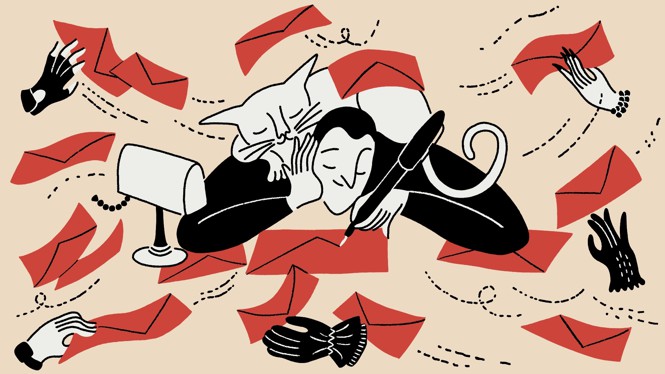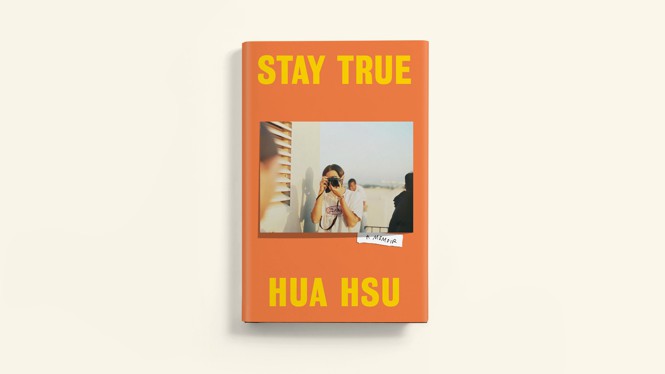
Rebecca Rashid produces an Atlantic podcast called How to Build a Happy Life. The series, hosted by Arthur C. Brooks, joins scientific data with snapshots of human experience to help listeners find the path to a more fulfilling existence. I called Rebecca to chat about what she’s learned, and about the advice she might offer to those hoping for a happier 2023. But first, here are three new stories from The Atlantic.
- The end of the Silicon Valley myth
- Just how badly does Apple need China?
- The myth of political independence
A New Formula
Isabel Fattal: What’s one thing many of us might do that gets in the way of our happiness without our realizing it?
Rebecca Rashid: If I could point to any across-the-board thing we struggle with, I think it’s the gap between knowledge and practice. For example, you’re aware that your social life is not where it needs to be. Olga [Khazan] has this moment in our friendship episode where she says, essentially, that adult friendships can seem logistically impossible; just getting dinner on a weeknight is like, When should I get the babysitter? 7 o’clock? Where should I park downtown? All of these extraneous factors make something as simple as meeting for dinner feel overwhelming.
This is a simple example of something we know we need to prioritize, yet putting it into action can fall by the wayside because of trivial logistics.
Isabel: The last episode of this season of How to Build a Happy Life focused on a new formula for happiness. Can you talk about what that formula looks like?
Rebecca: The happiness formula that’s prevalent in Western well-being practices is focused on habits: a lot of self-management and individualized, autonomous behaviors that will eventually lead you to being happy. But the psychiatrist Robert Waldinger, who has led one of the longest studies on human happiness, told us that the key to a happy life is our relationships—the reliability of them, the longevity of them, the depth of them.
That sounds really obvious and simple, but lots of things make it difficult for us to form lasting relationships, such as increased use of technology, remote work, and the way the pandemic has made some of us accustomed to isolation. So the new formula for happiness is basically investing in, reinvesting in, or creating relationships in a world that doesn’t always make that easy.
Isabel: What would you say to those people who might be skeptical about studying the science of happiness?
Rebecca: Because happiness is subjective, and there are many other factors that can affect it—genetic history, family history, life experience, whatever it may be—some people are wary of applying a broad framework to an experience that’s so different for every person, or resorting to what might seem like quick-fix solutions for something so consequential.
Also, a lot of how people live today is so diametrically opposed to the advice. For example, what I said about a new formula for happiness, relationship building: Have as many people as possible in your life that will support you. Build a community. This advice is coming after some of the most socially isolated years of people’s lives. These real-life factors can make simple solutions appear overgeneralized or unattainable.
And lastly—but perhaps most important—the science of happiness might feel like a luxury compared with many of our present-day concerns, such as job security and economic uncertainty.
That said, we’re all curious about how to live even a little bit better, and that’s where you can view the science of happiness as a tool. There is no perfect, prescriptive solution. As with anything else, take what works for you and leave what doesn’t.
Isabel: You’ve also co-hosted the podcast series How to Start Over with Olga Khazan. Do you have any advice for people looking to make changes in the new year?
Rebecca: I remember one listener emailing us to say that the most helpful advice from How to Start Over was simply giving language to what’s going on and providing an emotional grammar for what someone experiences when making a change.
After the pandemic, a lot of my friends have said, “I’m just going to finally up and move to Europe. That’s always been my dream.” Instead of trying to identify whether that’s the right or wrong thing, just think about: How much would daily life be different? What is the change you’re seeking, and how much would this action get you closer to it?
Related:
Today’s News
- Russia launched a new wave of strikes against Ukraine, which could leave many residents without power into the new year.
- Travelers from China will be required to present negative COVID-19 tests before boarding flights bound for the United States amid China’s shift on “zero COVID” and a surge of infections in Beijing.
- Prosecutors in New York are investigating whether Representative-elect George Santos committed any crimes related to his background and finances on the campaign trail.
Evening Read

The Surprisingly Profound Power of Thank-You Notes
By Abdullah Shihipar
Certainly I’m not the first person to suggest, as New Year’s approaches, that a little reflection might be in order. Plenty of us take the opportunity to think about the year that has passed—what we’re proud of, what we could have done differently, how we changed—and set resolutions for the year ahead. As helpful as this contemplation can be, though, it tends to be somewhat self-involved: We focus on our own accomplishments, but not always on the people in our lives who made them possible. In recent years, I’ve tried something different.
Near the end of December, I open my email or pick up a pen, and I begin composing thank-you notes. The messages are usually just a few sentences long: I recap my interactions with the recipient that year, put my finger on what I appreciated, and say I’m grateful. But when I consider whom to thank, I realize the list could go on and on. I try to think of everyone who made my year better: the established journalist who referred me to a radio program, the HR staff who processed my paperwork, the friend who dropped off groceries when I was recovering from COVID. Almost always, I get a note back expressing similar gratitude.
More From The Atlantic
Culture Break

Watch. Avatar: The Way of Water, whose “most ridiculous” new character actually does the film a service.
Read. Stay True, by Hua Hsu, a memoir that is both a coming-of-age story and a tale of an unlikely friendship.
Or say goodbye to 2022 by reading another one of the best books of the year, as selected by our critics.
P.S.
I asked Rebecca if she’s been reading any good books that you might want to pick up as you look toward the new year. She recommends The Creative Act: A Way of Being, by the famed music producer Rick Rubin. “I’m loving the autopsy on our definition of creativity and why we often conflate creative ‘success’ with productivity,” Rebecca told me.
— Isabel
Kate Lindsay contributed to this newsletter.







